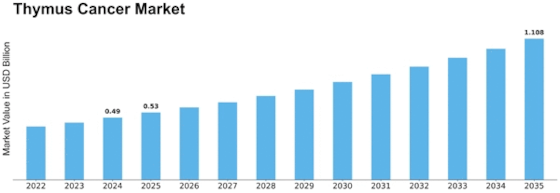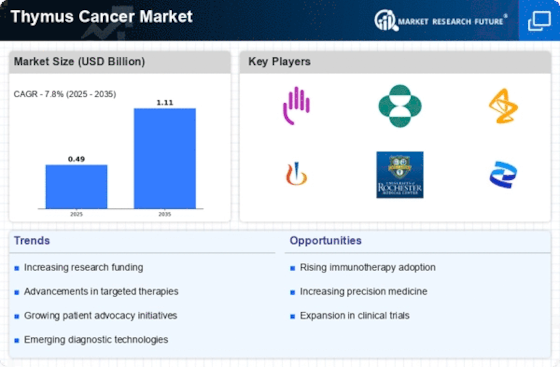Thymus Cancer Size
Thymus Cancer Market Growth Projections and Opportunities
The market for thymus cancer treatment is influenced by the rarity of this type of cancer. Thymus cancers are relatively uncommon, and the limited patient population impacts the market dynamics, influencing research priorities and therapeutic development. The diagnostic technology choices driving the thymus cancer market have now been widely acclaimed to be the most influential factor that thymus cancer market. The Updating of the technology in medical imaging such as MRI, early detection with the availability of diagnostic methods and sampling (biopsy), disseminates into timely and precise diagnosis with consequent treatment towards better outcome, and shifting towards the market landscape. The thymus cancer and myasthenia gravis are often seen to be related as it is an autoimmune disorder. This association will, however, play a role in the treatment approach that is being implemented because both conditions will have to be considered together meaning that development of targeted therapies as well as treatments that are combined will all be affected. Immune system related drugs, nanotechnologies and other immunotherapies are found to be effective in the treatment of thymomas. Due to the discovery of immune checkpoint inhibitors and additional methods that help the immune system, immunotherapy now offers a variety of approaches for cancer patients. This includes the possibility of treating thymus cancers among other types that do not respond well to traditional treatment. The scarcity of unique therapeutic options that thymus cancer patients are presented with has a major impact on medical market formation. With the use of operation, chemotherapy, and radiation being the main techniques, there must be many alternative solutions found and sophisticated, giving rise to research and development studies. Since thymus cancer is very rare throughout the world, the joint work in research and clinical trials of all the nations is of a critical importance. The collaboration of research institutions, pharmaceutical companies, and healthcare systems from countries all over the world is applied in the conjoining of the resources, knowledge and medical records, which in turn contributes significantly to the advancement of thymus cancer management by professionals in the field of cancer treatment. Patients' organizations and public awareness activities involvement and prominence are a determinant of thymus cancer market trends. Provision of information to the public, health care systems, and legislature expands to inclusion of early diagnosis, support for patients and funding research. Economic factors, including healthcare budgets and reimbursement policies, impact the availability and affordability of thymus cancer treatments. The cost of specialized treatments, coupled with limited patient numbers, poses economic challenges for both pharmaceutical companies and healthcare systems.



















Leave a Comment